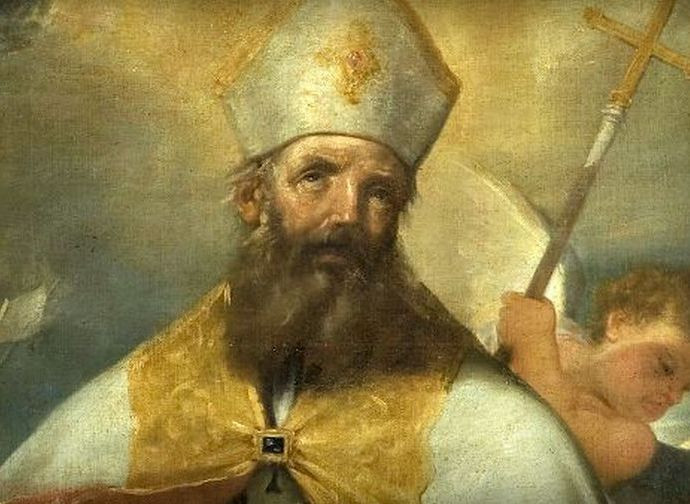Saint Peter Chrysologus
For his sermons he was proclaimed Doctor of the Church

The nickname of Chrysologus, Greek term for “golden word”, was deserved for the eloquence with which he set out the truths of faith. Allegedly it was given to him by the Empress Galla Placidia (daughter of Theodosius I, one of the three emperors who had jointly issued the Edict of Thessalonica), a fervent Christian and central figure in the history of the 5th century.
Saint Peter Chrysologus (late 4th century - c. 450) was born in Imola, Italy. His spiritual father, as confirmed in one of his sermons, was the bishop Saint Cornelius (“he was my father, he gave me life through the Gospel”), who baptized him, trained him and ordained him deacon. We don't know much else about the rest of his youth. The most detailed accounts of his life concern the period of his episcopal ministry in Ravenna, elevated to metropolitan seat of the Church around 431 and then capital of the Western Roman Empire (from 402).
According to tradition, reported in the Liber Pontificalis Ecclesiae Ravennatis by the historian and priest Andrea Agnello (9th century), it was Pope Sixtus III (432-440) who appointed him bishop of Ravenna after having had a vision of the future saint flanked by the apostle Saint Peter and Saint Apollinaris. The Pope himself consecrated him and listened to his first speech as bishop, with Galla Placidia also present. This happened around 433.
Two years earlier, at the Council of Ephesus, the divine motherhood of Mary had been dogmatically defined and the doctrine of Nestorius declared heretical. He refused to call the Virgin Theotókos (Mother of God) and denied the hypostatic union of the two natures - human and divine - in the one person of Jesus Christ, whose separation into two persons he ended up supporting. In the following years another Christological heresy arose, namely the monophysitism of the archimandrite Eutyches, who fell into an opposite error to that of Nestorius, because he sustained the presence in Christ of only the divine nature, thus denying all the sufferings endured by the Redeemer in the flesh.
In 449, after Eutyches’ grave theological error had been condemned by the synod of Constantinople, the Eastern archimandrite questioned Chrysologus as Metropolitan of the imperial See of the West: the holy bishop of Ravenna responded by reiterating the correct Christological doctrine and urged him to turn to the Pope (then Saint Leo the Great), i.e., to the one “through whom blessed Peter continues to teach, to those who seek it, the truth of the faith”. As if to say that the primacy of the Holy See, established by divine will, remained so and could certainly not be affected by the decline of Imperial Rome. Precisely through that primacy, in 451, Christians were then confirmed in the faith: a dogmatic epistle of Pope Leo (the Tomus ad Flavianum) condemning monophysitism was solemnly read out at the Council of Chalcedon.
Together with Galla Placidia, whom he called mater christiani perennis et fidelis imperii, he began the construction of the Petrine Basilica in Classe, no longer standing. The saint also consecrated the church of Saint John the Evangelist, the oldest in Ravenna, commissioned by the empress herself after a vow she made to Jesus' favourite disciple during a storm at sea.
Chrysologus died where he grew up, in Imola, and wished to be buried near the tomb of the martyr Saint Cassian, the main patron saint of the diocese of Imola. Almost three centuries later, the bishop of Ravenna, Saint Felix (†725), compiled a collection of the homilies of his predecessor, for a total of 176, although the list was later partly revised. For his sermons (in which he confuted heresies, effectively explained the mystery of the Incarnation and the Apostles’ Creed, extolled Saint John the Baptist and the Blessed Virgin, recalled the heroic sacrifice of Saint Apollinaris, first bishop of Ravenna, etc.), Saint Peter Chrysologus was proclaimed Doctor of the Church by Benedict XIII in 1729.
